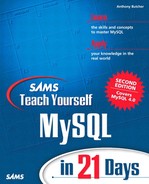Q&A
| Q1: | Where can I learn more about PHP? |
| A1: | Visit
http://www.php.net/, the official PHP Web site, and http://www.phpbuilder.com/, which contains some excellent resources. There are also other Sams titles on the subject that are worth studying if you want to put PHP to serious use.
For more hands-on experience with PHP, you will need a Web server that runs Apache onto which you can install PHP. Visit http://httpd.apache.org/ and search for “LAMP” resources, this being an acronym for the Linux, Apache, MySQL, and PHP combination of software. |
| Q2: | Why should I use PHP rather than another language? |
| A2: | A wide range of server-side languages currently are on the market. PHP has the advantage that it's free, easy to learn, and fast to develop in, and can be installed onto the most popular platforms, including Linux, Unix, and Windows. It can be used in almost any Web-based application and is ideally suited to database-access applications. |
| Q3: | Are there times when I should not use PHP? |
| A3: | Remember that PHP is designed to run Web applications. It is possible to write standalone scripts in PHP, but it's seldom used this way. If a standalone program is your main objective, consider a different language such as Perl or C.
Because PHP is an interpreted language, it may not be as fast as a compiled language such as C. If you are writing a program that will be used intensively, and speed is important, a compiled language may be a better option. |
..................Content has been hidden....................
You can't read the all page of ebook, please click here login for view all page.
